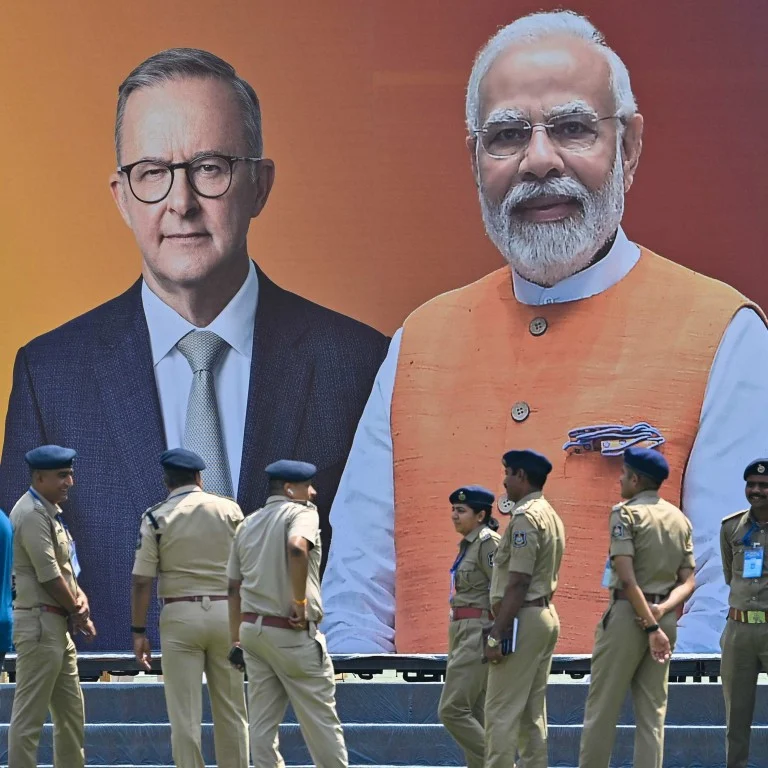
From Trade to Defence, Australia leans into India's friendship to bat away China's threat

On Tuesday, Australian Prime Minister Anthony Albanese and a trade delegation arrived in India. According to analysts, the trip was not just about economic diversification and containing China, but also about winning over domestic voters.
Albanese is due to discuss “trade and investment, renewable energy, technology, military and security cooperation” with their counterpart Narendra Modi, who had invited him to New Delhi. Before his trip, Albanese delivered a speech at a business summit in Sydney.
He said, “Our two nations have a rich history that is unified by our democratic values and enlivened by a genuine friendship and fierce sporting rivalry. “Our vast, diverse, and striving Indian-Australian community makes Australia a better place by any standard.
Just the sixth-largest trading partner for goods and services with Australia was India. According to Priya Chacko, a senior lecturer in international politics at the University of Adelaide, the two countries’ developing connection extends beyond commerce and is about opposing China as well as winning over Australian voters. “Australia has other friends who share its values, so it will be easier for Australia to push back against Chinese ambition and economic supremacy.
There may also be electoral imperatives and a need to appeal to the expanding Indian diaspora.
Both Modi and Albanese are anticipated to attend a cricket game in Ahmedabad on Thursday as Australia plays India in the fourth and final game of their series in front of what could be a record test crowd. The two countries have a long-standing animosity in cricket.
For the first day of the fourth Test, more than 110,000 spectators are anticipated at the Narendra Modi stadium, the largest cricket venue in the world. At the conference, Albanese said that the delegation of 25 CEOs he was leading would be one of the largest ever sent to one of Australia’s trading partners. The Australian government’s objectives to diversify its trading partners and products would be in line with increasing trade with India, Albanese stated.
According to the Australian Trade Department, Australia’s trade with India in 2021–22 totalled A$46 billion (US$31 billion), or about the same as Singapore’s. Compared to China, which accounts for 27% of Australian commerce, or A$285 billion, this accounts for slightly over 4% of Australian trade. Australia has been expanding its range of exports.
when the Morrison administration demanded an impartial investigation of the coronavirus without informing Beijing at the onset of the outbreak, there were repercussions from China. In Canberra and among Australian exporters, there is a pressing need to diversify into new markets as a result of informal limitations on a number of important trades, including coal and wine.
Analysts claim that India cannot take the place of China as a trading partner, although discussions in this regard have moved forward swiftly. The Australia-India Economic Cooperation Trade Agreement was concluded by Canberra and Delhi last year, putting an end to ten years of negotiations hampered by obstacles and differences. The Centre for
Australia-India Relations is a national platform to improve Australia’s ties with India in a variety of spheres, including business and science, as stated by foreign minister Penny Wong last month.
Malabar naval drills between India, Japan, and the US are part of the defence relationship between the nations. Australia has continued to hold the position that it will not publicly criticise India for the latter’s failure to denounce Russia and its abuses of human rights against Indian Muslims.
The Indian diaspora is becoming more active in Australian politics. India is now Australia’s second-largest immigrant community, and politicians, including Albanese, openly courted their support in the federal election last year.
Politicians with Indian ancestry are becoming more prevalent in Australia. India has made progress, but still has internal institutional flaws including corruption, according to Brendan Augustin, head of the Australian Institute of International Affairs Western Australia.
India is not going to be like China or Australia’s old allies in East Asia, but it also is not going to be as terrible as the “India of the past,” said Augustin, a former Australian diplomat and executive in the resources sector.







